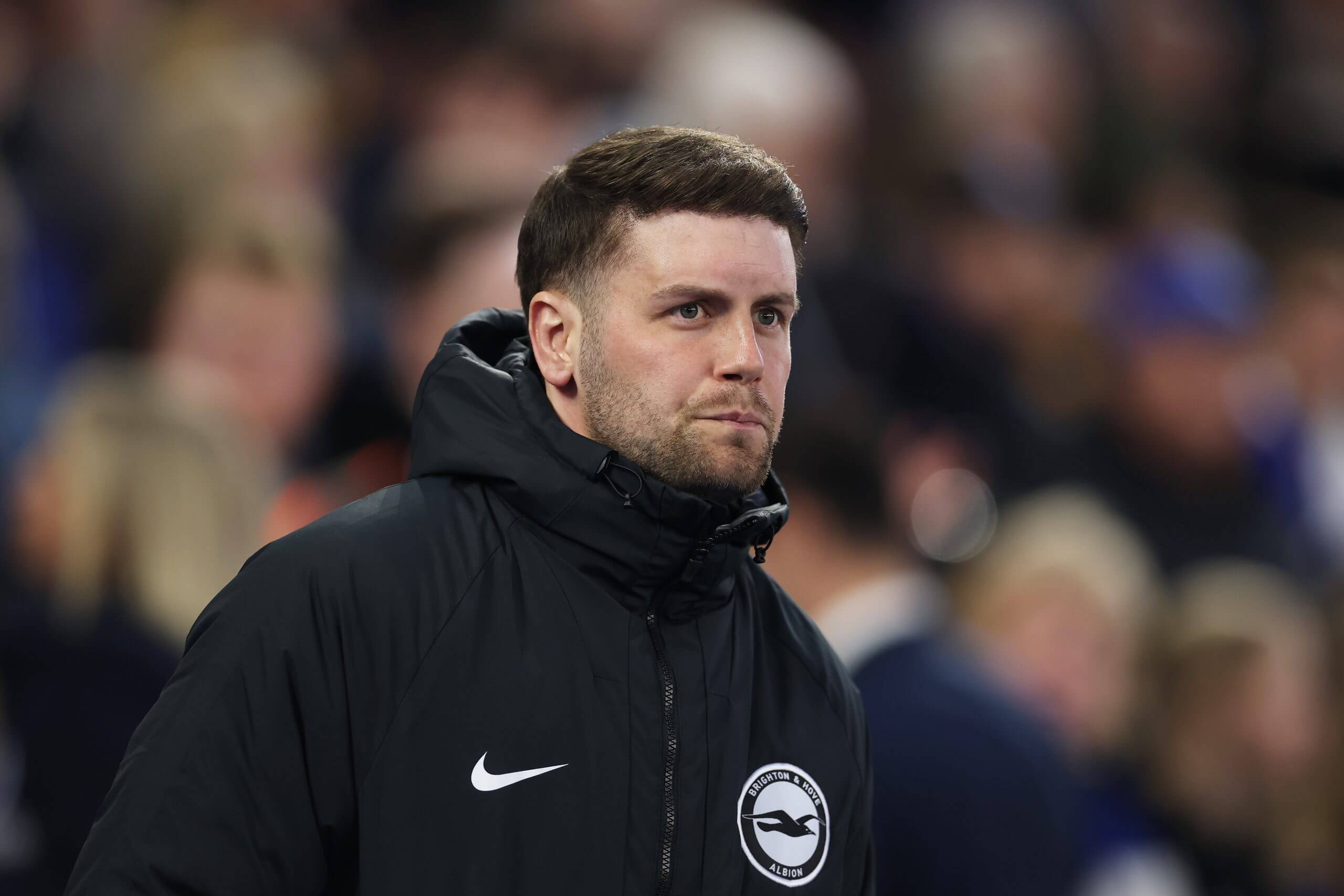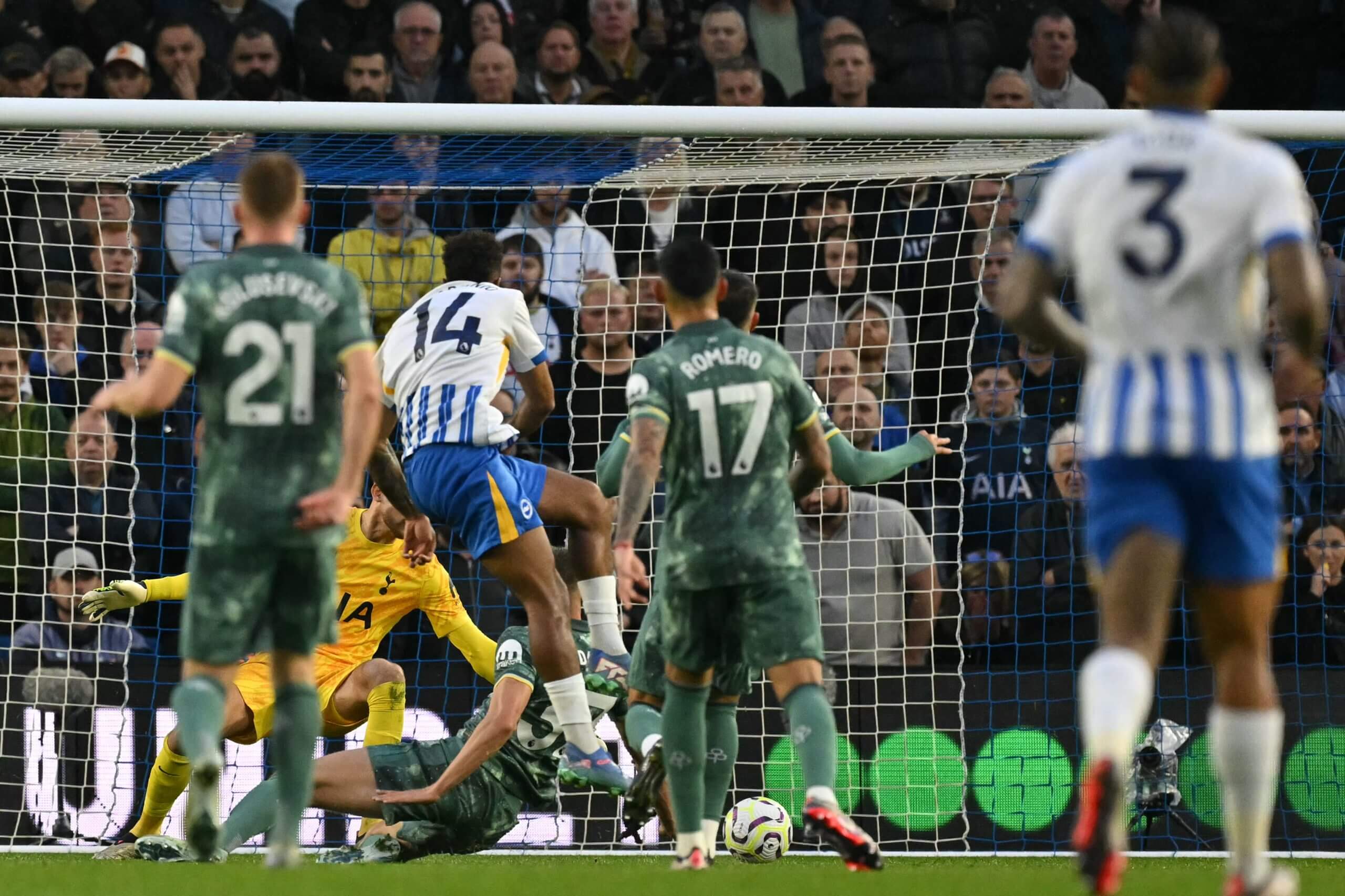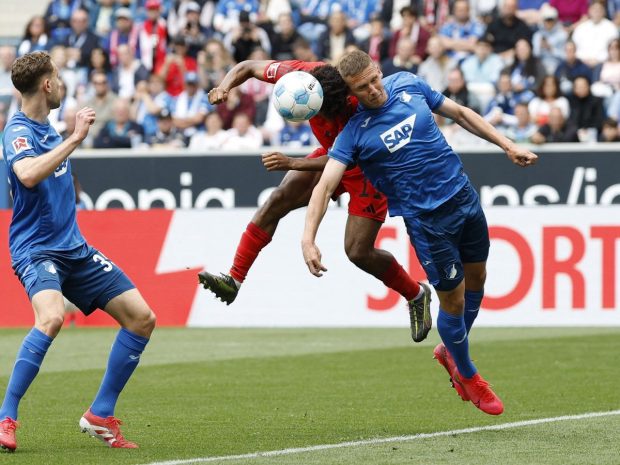
The twists and turns have been unrelenting as Brighton & Hove Albion pursue a return to European football in their first season under Fabian Hurzeler.
They have been in the top half of the Premier League table throughout, although that masks the roller-coaster ride these nine months have been.
Brighton were in first place after their opening three games in August, and suffered just two defeats in the 13 fixtures up to the end of November. By the beginning of February, however, they had dropped to 10th with a humiliating 7-0 defeat at Nottingham Forest, having already endured a run of eight winless matches between late November and the middle of January.
The pattern of fluctuating fortunes continued with six straight victories across all competitions and then a draw at champions Manchester City in the seven matches after that thrashing at Forest.

Hurzeler and Brighton have faced a testing two weeks (Warren Little/Getty Images)
They were in the ascendency again entering the final international break of the season in March, but losses since then at home to Aston Villa last week (3-0) and at bitter rivals Crystal Palace on Saturday (2-1) — on the back of losing an FA Cup quarter-final to visitors Forest on penalties — have renewed questions over whether they have what it takes to achieve their Europe ambitions.
The Athletic assesses their chances…
What is the state of play?
Hurzeler’s side are ninth in the Premier League with 47 points after 31 of their 38 games, an indication in itself of how difficult it is to predict what comes next. They were eighth after losing at Selhurst Park on the weekend, only for Fulham to move above them with a surprise home win over Liverpool on Sunday, a result that ended an unbeaten league run of 26 matches for the champions-elect.
Advertisement
Six points separate Brighton and Chelsea in fourth place. The race is so congested that FA Cup semi-finalists Palace have an outside chance of making Europe via their league position, and they are in the bottom half of the table. The 11th-placed Palace are four points behind Brighton with a game in hand.
At the corresponding stage of last season, Brighton were four points and one place worse off under Hurzeler’s predecessor, Roberto De Zerbi. They then won only one of their final seven league matches, losing four, to finish 11th, a point and a place below Palace, having gone out of the Europa League at the round-of-16 stage in March 2024 with a 4-1 aggregate defeat against Roma.
Hurzeler will not want a repeat of that scenario after becoming the first Brighton boss for 93 years to lose both league meetings with Palace in the same season (they were also beaten 3-1 at the Amex Stadium in December).
With everyone still having around 20 per cent of the season to play (fifth-placed Newcastle United also have a game in hand on Brighton), there is high potential for change before the music stops with the final round of fixtures on May 25.
How tough is Brighton’s run-in?
According to Opta’s Power Rankings — a global ranking system containing more than 13,000 clubs rated between zero (lowest) and 100 (highest) — the difficulty of Brighton’s remaining matches ranks towards the middle of those facing the 20 Premier League sides.
Encouragingly, three of the five clubs directly ahead of Brighton in the race for Europe (Chelsea, Newcastle and seventh-placed Aston Villa) are seen as having tougher run-ins, as do the two right behind them — Bournemouth in 10th and Palace.

The problem is that the only consistent feature of Brighton’s season so far has been inconsistency, which extends to what are deemed to be easier, challenging or difficult fixtures in the Opta model.
Take the three teams at the bottom of the table, heading straight back down to the Championship following their promotions in the summer. Hurzeler’s side drew their home games with both already-relegated Southampton and Ipswich Town, and it also ended all-square away against Leicester City.
Advertisement
On the flip side, they have drawn both matches with second-placed Arsenal and taken four points from the available six off Manchester City. That shows it is hard to know what to expect from Hurzeler’s Brighton from game to game — but we will give it a go.
What can we expect from their remaining home games?
Leicester’s visit on Saturday is the type of banana skin — or ‘Bananenschale’ as Hurzeler calls it — that Brighton fans have come to dread.
Ruud van Nistelrooy’s side created unwanted history with Monday’s 3-0 home defeat by Newcastle. That result means they are the first team in the 137-year history of the Football League to lose eight successive home games without scoring even a single goal, a sequence stretching back to Bobby De Cordova-Reid’s stoppage-time equaliser in their 2-2 draw with Brighton in December.
That match was a chronic waste of two points by the visitors — Hurzeler’s side were two goals up and coasting to victory until Jamie Vardy halved their lead in the 86th minute. The anxiety of supporters will not be helped by the prospect of Vardy facing a makeshift defence without the suspended Jan Paul van Hecke in this reverse fixture. The former England striker has seven goals and four assists in 12 Premier League appearances against Brighton.
Graham Potter’s second return to the Amex, with West Ham United on April 26, will not have the same edge as when the club’s former head coach came back with Chelsea less than two months after quitting in early September 2022 to take on the job at Stamford Bridge. Conventional wisdom decrees teams with nothing left to play for are ideal opponents at the back end of a season. West Ham fit that bill perfectly as, although they are only two places clear of the relegation zone, they have a 15-point lead over third-bottom Ipswich.
Advertisement
Brighton and Fulham are the only teams to have beaten Newcastle twice this season, with Danny Welbeck scoring the winning goals at St James’ Park in the league in October (1-0) and in extra time of an FA Cup last-16 tie in March (2-1). A lot rests in the front line on Welbeck and Joao Pedro, with Georginio Rutter possibly out for the rest of the season because of an ankle injury.
Newcastle will be dangerous opponents at the Amex on May 4. Buoyed by ending the club’s 70-year wait for a major trophy in the Carabao Cup final last month, they are refocused on finishing high enough to qualify for a second Champions League campaign in three seasons.
A spot in UEFA’s blue-riband club competition is already a given for Liverpool and so, surely, is the title, with a lead of 11 points over second-placed Arsenal. That means they should rather fittingly be on the beach by the time they come to town on the penultimate weekend of the season.
Brighton’s remaining fixtures
|
DATE
|
OPPONENT
|
VENUE
|
|---|---|---|
|
April 12 |
Leicester City |
Home |
|
April 19 |
Brentford |
Away |
|
April 26 |
West Ham United |
Home |
|
May 4 |
Newcastle United |
Home |
|
May 10 |
Wolverhampton Wanderers |
Away |
|
May 18 |
Liverpool |
Home |
|
May 25 |
Tottenham Hotspur |
Away |
Will the away matches be more challenging?
Brighton are seventh in the Premier League’s away table, compared to 10th in the home version, so having fewer away matches to come over their remaining seven is not necessarily an advantage.
The most difficult of the three looks to be the next one, at Brentford over Easter weekend.
Matches between the clubs owned by former sports-betting colleagues turned enemies Tony Bloom and Matthew Benham are usually tight. Five of their seven Premier League meetings have either been draws or decided by a one-goal margin. They have similar records this season too, both winning 12 times and conceding 47 goals (Brentford have scored 51, two more than Brighton), so another close encounter is on the cards.
Thomas Frank’s team have shrugged off the departure of free-scoring England striker Ivan Toney in August to Al Ahli of the Saudi Pro League, with Bryan Mbeumo and Yoane Wissa contributing 30 league goals between them (16 and 14).
Advertisement
Brighton’s record against Wolves is much better — just two losses in the 13 Premier League meetings. The men from Wolverhampton were beaten at the Amex in a Carabao Cup tie in September (3-2), followed by a draw there in the league a month later (2-2) during the reign of Gary O’Neil. His Portuguese successor, Vitor Pereira, has guided Wolves from four points adrift of safety when he took over in December to 12 points above the relegation zone.
Fittingly, given the unpredictable nature of the campaign, who knows what the result or circumstances will be at Tottenham Hotspur on the day Hurzeler’s first season draws to a close? Spurs are a wretched 14th in the league in year two under Ange Postecoglou, a campaign typified by their visit to Brighton in October. From leading 2-0 at half-time, they crumbled, conceding three goals in 18 minutes at the start of the second half to lose 3-2.
Postecoglou’s job is on the line, but the Australian could still salvage Tottenham’s season by winning the Europa League — they are at home to Eintracht Frankfurt in the first leg of a quarter-final on Thursday. The Europa League final takes place in the Spanish city of Bilbao four days before Brighton’s visit.

Rutter fires home Brighton’s equaliser against Spurs (Glyn Kirk/Getty Images)
Where do they need to finish to make Europe?
A good question. Unfortunately, it is impossible to tell, considering the permutations governed by clubs potentially qualifying for more than one competition, with a knock-on impact on the number of places available to English sides.
In admittedly improbable circumstances, the side finishing 11th could qualify (this would require, among other things, Villa to win the Champions League, Spurs or Manchester United to win the Europa League, and Chelsea to win the Conference League).
With the Premier League almost certain to get a fifth Champions League spot for next season, and Carabao Cup winners Newcastle looking in a good position to seal at least a Europa League spot through their league position, it wouldn’t be getting too carried away to assume the top flight’s European places will stretch down to at least whoever comes seventh.
Opta’s Premier League Predictor, which projects the final standings by simulating the remaining games thousands of times to calculate an average outcome, gives Brighton a 17.3 per cent chance of finishing seventh or higher.
Advertisement
Brighton have defied the odds a few times in Hurzeler’s debut year — for good and for bad — and they may need to do the same if they are to return to European competition next season.
(Top photo: Joao Pedro and Brighton are chasing European qualification with seven games left; Mike Hewitt/Getty Images)
This news was originally published on this post .








Be the first to leave a comment